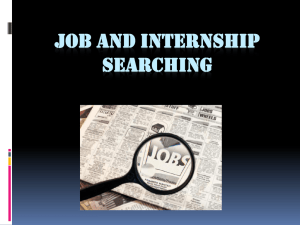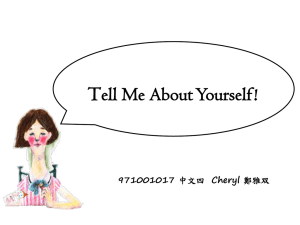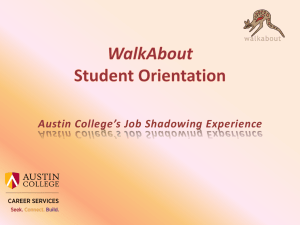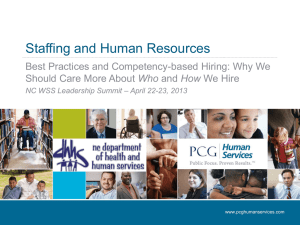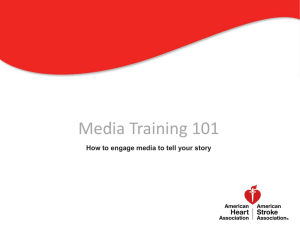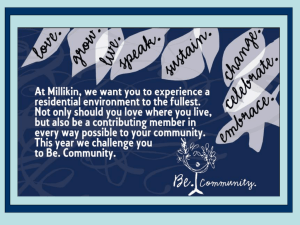Interviewing and Networking PowerPoint by Carl Sweet
advertisement
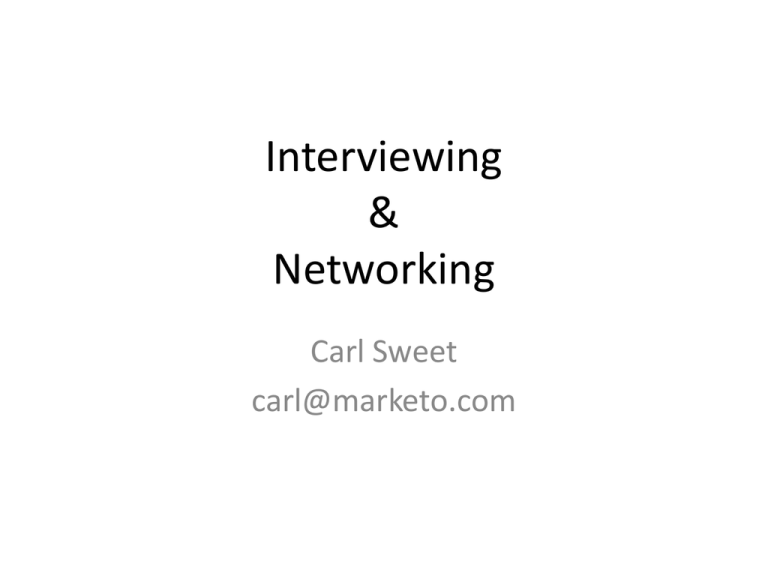
Interviewing & Networking Carl Sweet carl@marketo.com Interviewing There are five different types of interviews: • • • • • Impromptu Phone Behavioral/Value Based Unstructured Panel Interviewing – Basics Regardless of the type of interview, you will need to: •Show how you used your talents when tested. •Tell of a turning point in your college career and what you learned. •Select stories that reinforce your personal brand and show your passion and personality. •Tell how you developed or sharpened a key characteristic or skill – and the results achieved. •Show how you handled major change and lead others through it •Find hero stories where you saved the day. •Have a 30 second and two minute pitch about who you are, what you do and how you saved the day – practice this pitch. Interviewing - Basics Avoid…… •Don’t talk for too long or ramble. 2 minutes max. •Don’t tell stories that are not relevant to the target job. •Don’t lie or exaggerate. •Don’t omit sensory details and a bit of color. •Don’t forget to wrap up the story with a one sentence moral, key message, or lesson learned. Interviewing – WC & HMW* *What companies and hiring managers want Netflix •Trust/Collaboration •Accountability •Innovation Zynga •Innovation •Accountability •Speed •Collaboration Southwest Airlines •Creativity/Innovation •Trust/Collaboration •Customer Service Nordstrom •Trust/Collaboration •Innovation •Accountability •Competitive •Communication •Fun Tivo •Fun •Innovation •Collaboration •Accountability Intel •Customer Oriented •Trust •Quality •Innovation •Collaboration •Accountability Interviewing – WC & HMW The key corporate values are: •Innovation •Communication •Collaboration •Accountability Hiring managers are looking for key behaviors. These could be: •Flexibility •Leadership •Motivation •Conflict Resolution •Teamwork •Adaptability •Persuasion •Building Relationships •Decision Making •Analytical Skills Interviewing - Phone • PRACTICE • Know your resume! • Never conduct a phone interview the first time the company calls • Try to find out details about the job at the beginning of the interview • Ask questions such as “How long have you been at the company”, “What do you like about the company”, etc. • Show enthusiasm for the company and the job • Engage the person you are interviewing with • Ask what the next steps are Interviewing - Live • Try to interview in the AM, try not to interview Friday afternoon • Communication skills are key and can often supersede technical skills/knowledge • Show how your abilities translate into the company’s core values. Innovation, collaboration, communication, accountability. • Ask questions about what it is like to work there • Get business cards from everyone • Link into them in LinkedIN • Ask about next steps • Send thank you notes to everyone • Include “Tag Questions” in email correspondences Interviewing - Live • PRACTICE – Video Tape • Know your resume! • Dress well • Show passion in your skills and abilities • Show enthusiasm for the job and the company • Do your research on the company – shows engagement • Bring copies of your resume • Soft skills • Prepare for odd ball questions – We want to know your thinking process • Behavioral questions Interviewing – Behavioral Based More and more companies are now turning to a Behavioral Based, Values Driven Interview. Behavioral based interviewing is interviewing based on discovering how the interviewee acted in specific employment-related situations. The logic is that how the candidate behaved in the past will predict how the candidate will behave in the future i.e. past performance predicts future performance. In a traditional interview, questions are asked which typically have straight forward answers like "What are your strengths and weaknesses?" or "What major challenges and problems did you face? How did you handle them?" or "Describe a typical work week." In a behavioral based interview, questions will be phrased: “Tell me about a time you….” “Think back on a situation where you….” Interview – How to “Game” the System An example of requirements from a job description. Break out the Hard Skills, Desired Behaviors and Values • • • • • • • • Bachelors degree in technical or business field with excellent academic record (Hard Skill) 3-6 years of progressive experience in FP&A, management consulting, investment banking, corporate strategy or equivalent experience (Hard Skill) Distinctive problem solving and analytical skills (Desired Behavior) Demonstrated strong performance in prior roles, with increasing levels of responsibility and independence. (Desired Behavior/Value) Superior financial modeling skills in Excel; Proficient PowerPoint skills; Familiarity with statistical analysis techniques/tools is a plus (Hard Skill) Excellent verbal and written communication skills are required (Hard Skill) Superior attention to detail and quality (Desired Behavior) Aptitude for financial tools/systems including planning systems, reporting applications, business intelligence software applications, etc. (Hard Skill and Desired Team Behavior) Interview – How to “Game” the System An example of Responsibilities from a job description. Break our the What, How and Who • • • • • • • • • Develops and executes on multi-year business plans. (What) Identifies and pursues potential partnerships with merchants and manufacturers. (What and Who) Establish and maintain highly collaborative merchant/vendor relationships to identify and execute assortment growth opportunities. (What) Negotiates promotional terms with merchants and manufacturers. (What) Selects and promotes deal inventory, including targeted email campaigns, display advertising and social marketing. (What) Assists in the development of a site strategy to capture Marketing Development Funds from manufacturers. (What and How) Performs rigorous analysis of merchandising decisions. (What) Reacts to industry and competitive trends. (What and How) Drives unit, revenue and margin growth. (What) Interview - Unstructured • Same questions will be asked over and over. • Interviewer will use your resume as a basis of asking questions. • Questions will generally be all over the map. • You may need to push the interview along or redirect the questioning towards your key skill sets. • Usually in small companies - <100 employees. Networking Impromptu Networking – McDonalds, parties, junk yards Planned Networking – LinkedIN, job fairs, interviews, sending emails, informational interview • Make a 30 second and 2 minute pitch – create a brand • Be able to say who you are, what you do, and what makes you great • Practice! • Company Website • Monster/Hotjobs, Craigslist, Dice, Indeed, Simplyhired • LinkedIN • *.*@whatevercompany.com • Your friends are your friends Networking – Job Fairs/Interviews See who is going to be at the job fairs and research these companies - engage Research the company and the people you will met and engage the interviewers



